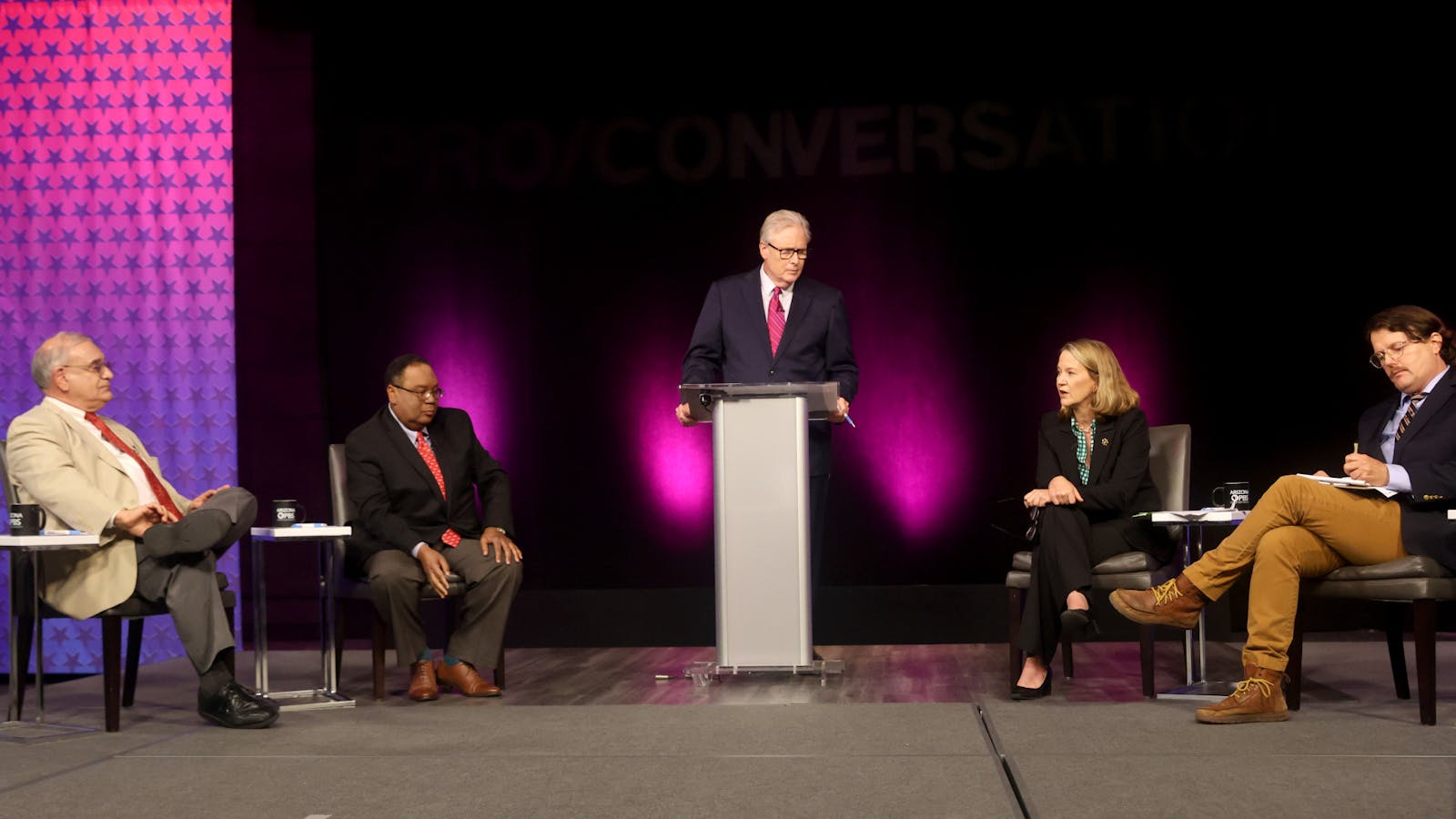ASU students created a petition in hopes of canceling a debate on the Downtown Phoenix Campus Thursday over concerns about two of the chosen speakers’ credibility.
The debate, part of the PRO/CONversations series, focused on whether or not to end birthright citizenship in the U.S. The students petitioning said the two speakers in favor of the abolition of birthright citizenship should not have been given the platform.
They collected over 120 signatures beforehand. Although the debate proceeded as planned, the students also passed out fliers at the studio filming.
The debate featured Mark Krikorian, the executive director of the Center for Immigration Studies, and Horace Cooper, a senior fellow with the National Center for Public Policy Research, in favor of eliminating birthright citizenship. Arizona Attorney General Kris Mayes and Chris Newman, the legal director of the National Day Laborer Organizing Network, argued against the idea.
The University’s Institute of Politics held the event in partnership with Open to Debate, a nonprofit organization that hosts political debates. It was produced by Arizona PBS.
Leah Silverman, a junior studying English, and Aaron Lige, a senior studying psychology, said they wrote the petition after hearing of the debate and researching the speakers.
“I just wanted to look at who these people were, and pretty quickly I just did not like what I saw,” Lige said.
The petition said CIS “has come under fire numerous times for publishing reports deemed to be false or misleading.” The Southern Poverty Law Center designates CIS as a hate group.
referenced which detailed
The petition said NCPPR has a history of opposition to environmental regulations and LGBTQ+ rights. According to the Center for Media and Democracy, the organization is “against government regulations, LGBTQ rights, and ESG investing, claiming that human activity plays no role in climate change.”
The petition also brought up that Cooper plead guilty in 2010 to a five-count felony indictment concerning the illegal acceptance of gifts from lobbyists as a federal employee, according to the FBI. In exchange for the plea, the charges were dropped to a misdemeanor.
NCPPR did not respond to a request for comment.
This document was emailed as a PDF to the State Press on Monday, Oct. 6, 2025, by Leah Silverman, one of the petitioners. It shows the petition to challenge the credibility of speakers Horace Cooper and Mark Krikorian at the PRO/CONversations debate series.
Silverman and Lige said it was “disingenuous” for the University to platform people they said lack credibility, especially for a debate on a sensitive topic with officials like Mayes.
Before the debate, Krikorian said in a written statement that he found it “actually kind of funny” that the petition called him unqualified as he has been writing about the topic of birth right citizenship since 1993.
“I look forward to engaging with the attorney general and Chris Newman on the issue,” Krikorian said.
In a written statement, a spokesperson for Kris Mayes said the attorney general was “prepared to let her arguments in favor of birthright citizenship stand on their merits and welcomes the chance to share why this Constitutional right is a benefit to our nation.”
“We appreciate the points of view expressed in this letter and acknowledge that there are strong opinions about the subject matter and the messengers,” a University spokesperson said in a written statement referencing the petition. “We invite and encourage engagement and the respectful behavior that forms the foundation of a university learning environment.”
In a written statement, Arizona PBS General Manager Scott Woelfel said the broadcaster was solely responsible for the location and production, while Open to Debate chose the topic and debaters. Open to Debate did not respond to a request for comment.
Silverman said they disagree with the inclusion of Krikorian and Cooper on the same stage of the other two speakers, as it discredits the validity of the debate.
“These are not people who have equal credentials in this area, and so the debate itself is almost dishonest by positioning it this way,” Silverman said.
Lige said the debate’s unfair portrayal of the speakers as equals came off as a partisan decision by Open to Debate. Silverman said achieving a true non-partisan debate is difficult altogether.
“We should be careful, especially when giving people with harmful views a platform next to others who are very credible, because it makes that harmful rhetoric … look credible,” Silverman said.
Edited by Carsten Oyer, George Headley, Sophia Braccio and Ellis Preston.
Reach the reporter at apruiz@asu.edu and follow @andiruiz2405 on X.
Like The State Press on Facebook and follow @statepress on X.
Andi RuizPolitics Reporter
Andi Ruiz is a politics reporter at the State Press dedicated to serving her community with truth and honesty in her reporting. She has been working in broadcast and news since high school and was recently an anchor at The Cut Network during her first year at Cronkite. She is going into her second year at ASU as a Barrett Honors student studying journalism and mass communication with a minor in political science.
Continue supporting student journalism and donate to The State Press today.
